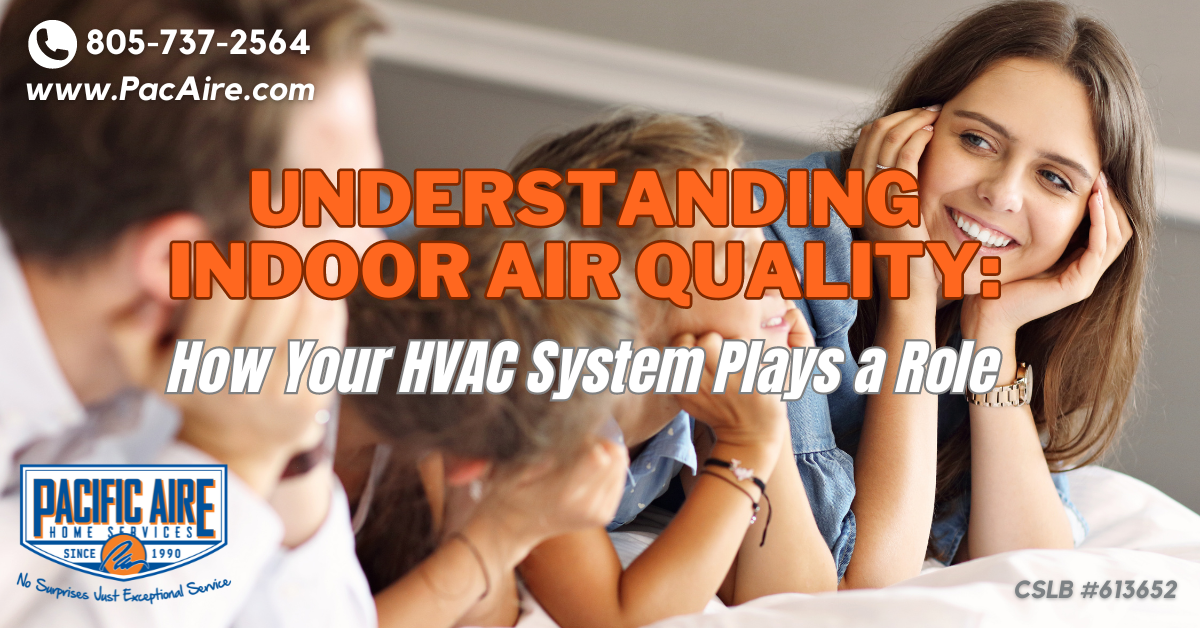In today’s world, where we spend a significant portion of our time indoors, the quality of the air we breathe inside our homes and workplaces has a profound impact on our health and well-being. Indoor air quality (IAQ) refers to the quality of the air within homes, buildings and structures, especially as it relates to the health and comfort of occupants. Often overlooked, the role of HVAC (Heating, Ventilation, and Air Conditioning) systems is crucial in maintaining and improving indoor air quality.
The importance of indoor air quality cannot be overstated. Poor IAQ can lead to various health issues, including allergies, asthma, respiratory infections, and even more severe conditions in the long term. Factors such as dust, pollen, pet dander, volatile organic compounds (VOCs), and mold spores can all contribute to indoor air pollution. Additionally, inadequate ventilation and high humidity levels can exacerbate these problems, creating an environment that is not only uncomfortable but also potentially harmful to our health.
Your HVAC system is central to managing indoor air quality effectively. While its primary function may be to regulate temperature, HVAC systems also play a crucial role in ventilation and air purification. Here’s how:
1. Ventilation: Proper ventilation is essential for maintaining a healthy indoor environment. HVAC systems help by exchanging stale indoor air with fresh outdoor air, diluting indoor pollutants and reducing their concentration. Modern HVAC systems are equipped with ventilation mechanisms that ensure adequate air exchange while also maintaining energy efficiency.
2. Filtration: HVAC systems incorporate filters that trap airborne particles as air circulates through the system. These filters capture dust, pollen, mold spores, and other pollutants, preventing them from recirculating into the indoor air. High-efficiency particulate air (HEPA) filters, in particular, are highly effective at removing even smaller particles, providing cleaner air for occupants.
3. Humidity Control: Excessive humidity can promote the growth of mold and mildew, exacerbating indoor air quality issues and contributing to respiratory problems. HVAC systems can regulate indoor humidity levels, ensuring that they remain within the optimal range for comfort and health. By controlling humidity, HVAC systems help prevent mold growth and maintain a comfortable indoor environment.
4. Air Purification: In addition to filtration, some HVAC systems incorporate air purification technologies such as UV-C lights or photocatalytic oxidation to further enhance indoor air quality. These systems can neutralize airborne pathogens, bacteria, and viruses, providing an added layer of protection against respiratory illnesses.
Regular maintenance of your HVAC system is essential to ensure optimal performance and indoor air quality. Here are some tips to keep your HVAC system running smoothly:
- Change Filters Regularly: Dirty filters restrict airflow and reduce the effectiveness of your HVAC system’s filtration capabilities. Make sure to replace filters according to the manufacturer’s recommendations, typically every one to three months.
- Schedule Professional Inspections: Regular inspections by qualified HVAC technicians can help identify and address any issues with your system before they escalate. They can also perform routine maintenance tasks such as cleaning coils and checking refrigerant levels to ensure optimal performance.
- Ensure Adequate Ventilation: In addition to relying on your HVAC system for ventilation, consider opening windows and doors when weather permits to allow for natural ventilation. Proper airflow is essential for maintaining good indoor air quality.
- Invest in Air Quality Monitoring: Consider investing in indoor air quality monitors to keep track of pollutant levels and humidity levels in your home. These devices can alert you to any potential issues and help you take appropriate action to address them.
By understanding the crucial role that HVAC systems play in maintaining indoor air quality, you can take proactive steps to ensure a healthier and more comfortable indoor environment for you and your loved ones. From proper ventilation to advanced air purification technologies, your HVAC system is your ally in the ongoing battle for cleaner, safer indoor air. Prioritize regular maintenance and invest in quality products and services to reap the benefits of improved indoor air quality for years to come.
Ultimately, indoor air quality is a critical aspect of our overall health and well-being. With the majority of our time spent indoors, ensuring that the air we breathe is clean and free of pollutants is paramount. Your HVAC system plays a significant role in achieving this goal, with its functions ranging from ventilation to filtration and air purification. By understanding how your HVAC system affects indoor air quality and implementing proper maintenance practices, you can create a healthier indoor environment for yourself and your family. Remember, when it comes to indoor air quality, your HVAC system is not just a luxury but a necessity.
Visit https://www.pacaire.com/home-air-quality/
or call us at 805-737-2564 to schedule an appointment for your home HVAC repair and replacement needs.


